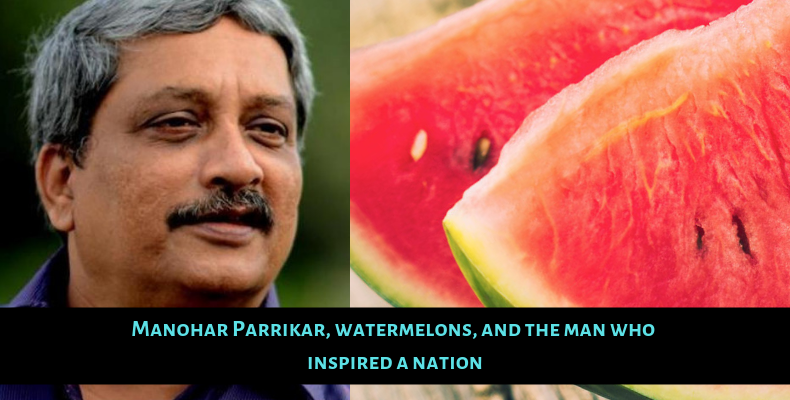Shri Manohar Parrikar was more than just a politician. He was more than just India’s Minister of Defence and more than just Goa’s Chief Minister. He was a loving husband, a dedicated father, but most importantly, he was a leader. In office and in his life, he inspired hundreds and thousands of young men and women, never shying away from the opportunity to share his own personal experiences.
People remember him and laud him for being the first IITian to take up the office of Chief Minister, in fact, his own college mates fondly remember ‘Manu’ as being a role model. In a recent article shared by Hindustan Times, Mukund Deshpande, a Pune-based civil engineer and another hostel mate of Parrikar, remembered a time in 1978 when the hostel mess staff went on an indefinite strike. “He was on good terms with the mess workers as he always participated in the committee. After the strike was called, he spoke to the workers. When they refused to serve us, he convinced 40 of us to cook ourselves. That was the best meal we ever had,”
In September 2016, the humble resident of Parra, Goa, addressed an audience at the 14th FGI Awards for Excellence held at Vadodra. It was there that he gave one of his most memorable speeches. It was a speech where he recounts his childhood, growing up in the village of Parra and taking part in the famous ‘Watermelon Festival’. It seemed like a trivial story, one that was meant to evoke a sense of humanity – but it was so much more. Here’s what he said:
“I am from the village of Parra in Goa, hence we are called Parrikars. My village is famous for its watermelons. When I was a child, the farmers would organize a watermelon-eating contest at the end of the harvest season in May. All the kids would be invited to eat as many watermelons as they wanted. Years later, I went to IIT Mumbai to study engineering. I went back to my village after six and a half years. I went to the market looking for watermelons. They were all gone. The ones that were there were so small. I went to see the farmer who hosted the watermelon-eating contest. His son had taken over. He would host the contest but there was a difference.
When the older farmer gave us watermelons to eat he would ask us to spit out the seeds into a bowl. We were told not to bite into the seeds. He was collecting the seeds for his next crop. We were unpaid child laborers, actually. He kept his best watermelons for the contest and he got the best seeds which would yield even bigger watermelons the next year. His son, when he took over, realized that the larger watermelons would fetch more money in the market so he sold the larger ones and kept the smaller ones for the contest. The next year, the watermelons were smaller, the year later even smaller.
In watermelons, the generation is one year. In seven years, Parra’s best watermelons were finished. In humans, generations change after 25 years. It will take us 200 years to figure out what we were doing wrong while educating our children. Unless we employ our best to train the next generation, this is what can happen to us.”
What do you think of this inspiring anecdote? Let us know in the comments below. You can also watch the address by clicking play on the video.


